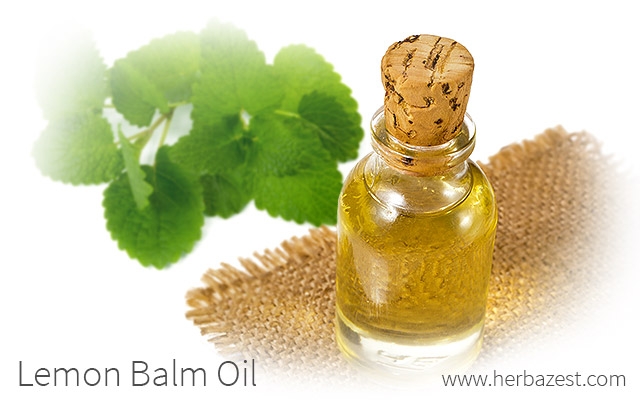Lemon balm oil is a very easy way to obtain the benefits of lemon balm and can be made at home without any complicated equipment. It is a very popular medicinal preparation and a useful addition to any herbal cabinet.
Lemon balm oil is often confused with lemon balm essential oil, but they are definitely not the same. While lemon balm essential oil is obtained through a long process of steam distillation that concentrates all of plant's constituents, lemon balm oil is usually made by macerating or softly heating the crushed leaves and stems in a carrier oil in order to extract their properties.
How to Make Lemon Balm Oil
To make lemon balm oil, you can use fresh or dried lemon balm leaves. The most popular methods of making lemon balm oil are maceration and heating. However, the first method can be followed by the latter.
Maceration or Soaking Method
This method takes some time and patience, but the results will be rewarding. To soak or macerate lemon balm, you will need:
- Fresh or dried lemon balm leaves (flower stalks can be included). If using fresh lemon balm, be sure the leaves don't have any traces of moisture, since even a small amount of water could attract mold and spoil the preparation.
- Many carrier oils can be used, such as olive oil, almond oil, and jojoba oil. Even a neutral oil like canola can be used, although many herbalists prefer organic oils.
- A blender or food processor
- A clean, dry jar in which to pour the infused oil
Step by step process:
- In the blender or food processor, add the lemon balm leaves and cover them completely with the oil. Blend until you obtain a grainy, pesto-like texture. This will allow for better absorption of lemon balm's active compounds in the carrier oil.
- Transfer the mixture to a clean, dry glass jar. The herbs must be covered by one or two inches (2.5 - 5 cm) of oil. Add more oil if needed.
- Seal the top of the jar and place it in a fresh, dry, dark cabinet.
- After a minimum of four weeks, take out the jar and strain the oil using a muslin cloth or a very tight weave of cheesecloth. Wring it out well with clean, dry hands to be sure you get the last drop of oil with all of lemon balm's medicinal properties. Put it back into a clean, dry jar, and your lemon balm oil will be ready to use. This oil can also be used to prepare lemon balm cream.
Heat Method
After blending the lemon balm leaves with the carrier oil as described before:
- Place the mixture of oil and herbs in a bowl and nest it in a saucepan half filled with water that is already over minimum heat. The bowl should fit tightly in the saucepan, but it shouldn't touch the water. This is called a double boiler.
- Let it simmer at minimum heat for four to eight hours. Use a kitchen thermometer to be sure the oil is always under 110F (43C) and the water doesn't evaporate completely. Don't leave the preparation unattended.
- When the time is right, remove the infused lemon balm oil from the heat and let it cool a bit at room temperature. Strain it while still warm and store it as indicated above.
Both the maceration and heat methods can be used combining lemon balm leaves with other herbs with similar or complementary properties, such as chamomile and Oregon grape, in order potentiate the healing power of the infused oil. Lemon balm oil can last two to three years when refrigerated.
Benefits of Lemon Balm Oil
The antiviral, astringent, analgesic, and antispasmodic properties of lemon balm oil are mostly used for the topical treatment of herpes simplex virus (HSV), both oral and genital.
Like other herbal infused oils, lemon balm oil helps to hold in moisture and heat, and although the use of lemon balm for herpes is the most common, its astringent and antibacterial qualities have skin care applications, not only as a lip balm, but also as a facial cleanser and moisturizer.
Lemon balm oil is extremely easy to make at home, and it is a must-have in any herbal cabinet, not only for its effective antiviral properties, but also for its cosmetic applications and practical uses.
Sources
- National Association for Holistic Aromatherapy, Aromatherapy Journal, Herbal Infused Oils and Salves, 2013
- The Environmental Working Group, MELISSA OFFICINALIS (LEMON BALM) OIL




